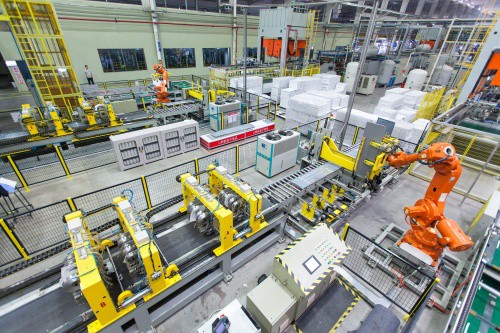For the second consecutive year, one of Haier factories has joined the ranks of the Global Lighthouse Network of advanced manufacturing leaders who are now integrating the technologies of the Fourth Industrial Revolution (4IR).
Formed in 2017 by the World Economic Forum in collaboration with McKinsey & Company, the Global Lighthouse Networks identifies factories worldwide that have deployed latest advancements in technologies such as artificial intelligence and Internet of Things (IoT) to enhance the efficiency of their production facilities.
The Shenyang Interconnected Refrigerator Factory of Haier, China's largest consumer electronics and home appliance producer, has been selected as one of 18 new factories to join the ranks of these lighthouses in 2019.
Haier’s Qingdao Central-AC (CAC) Interconnected Factory was the first to be recognised by WEF in September 2018.
Use cases for intelligent manufacturing
Called "lighthouses" due to their innovative and world-leading position, these factories are selected by the WEF based on the successful deployment of 4IR technologies to realise intelligent manufacturing, with demonstrated benefits on an operational, financial, and environmental level.
Cutting-edge technologies include artificial intelligence, big data analytics, IoT and 3D printing. Moreover, half of the new lighthouses are end-to-end factories, meaning that they are driving value beyond the manufacturing phase alone to create impact along the entire value chain. Both of Haier's lighthouses are end-to-end factories.
"Haier's Shenyang Interconnected Refrigerator Factory, also the first factory applying with interconnected ecosystem, was chosen for its user-centric, flexible mass customisation model, which is empowered by its independently-developed and scalable COSMOPlat platform, the world's largest mass customisation solutions platform," said Tingyi Hou, principal at Haier Shenyang Interconnected Factory.
Accumulated from intelligent manufacturing experience of 15 interconnected factories across China, Haier Smart Home comes up with 328 manufacturing standards, 87 steps methodology, and 56 handbooks to substantiate its proprietary COSMOPlat with cloudification for further automation and intelligent manufacturing level up among 122 factories.
Innovative manufacturing model
Compared to traditional manufacturing models, COSMOPlat digitally integrates the entire factory process and supply chain, leveraging big data, cloud computing, and IoT. It connects suppliers and consumers, enabling customers to communicate their preferences directly to the factory. Not only does this make customers participants in the transparent design and production process, but it also allows for product customisation according to consumer demands and even different or unique requests.
Customisation have resulted in products manufactured with higher precision according to actual customer requirements, which not only achieves greater efficiency but also opens up more possibilities for users.
An automated and intelligent production line and a digital information system seamlessly implement the entire process, improving direct labour productivity by 28%.
As a member of the WEF Global Lighthouse Network, Haier is actively sharing its experiences in industrial transformation, to aid the upgrading of the global manufacturing industry. It has already spearheaded the Hannover Proposal of Global Lighthouses which seeks to set and implement industry norms across standards, technology, security, talent and more.



